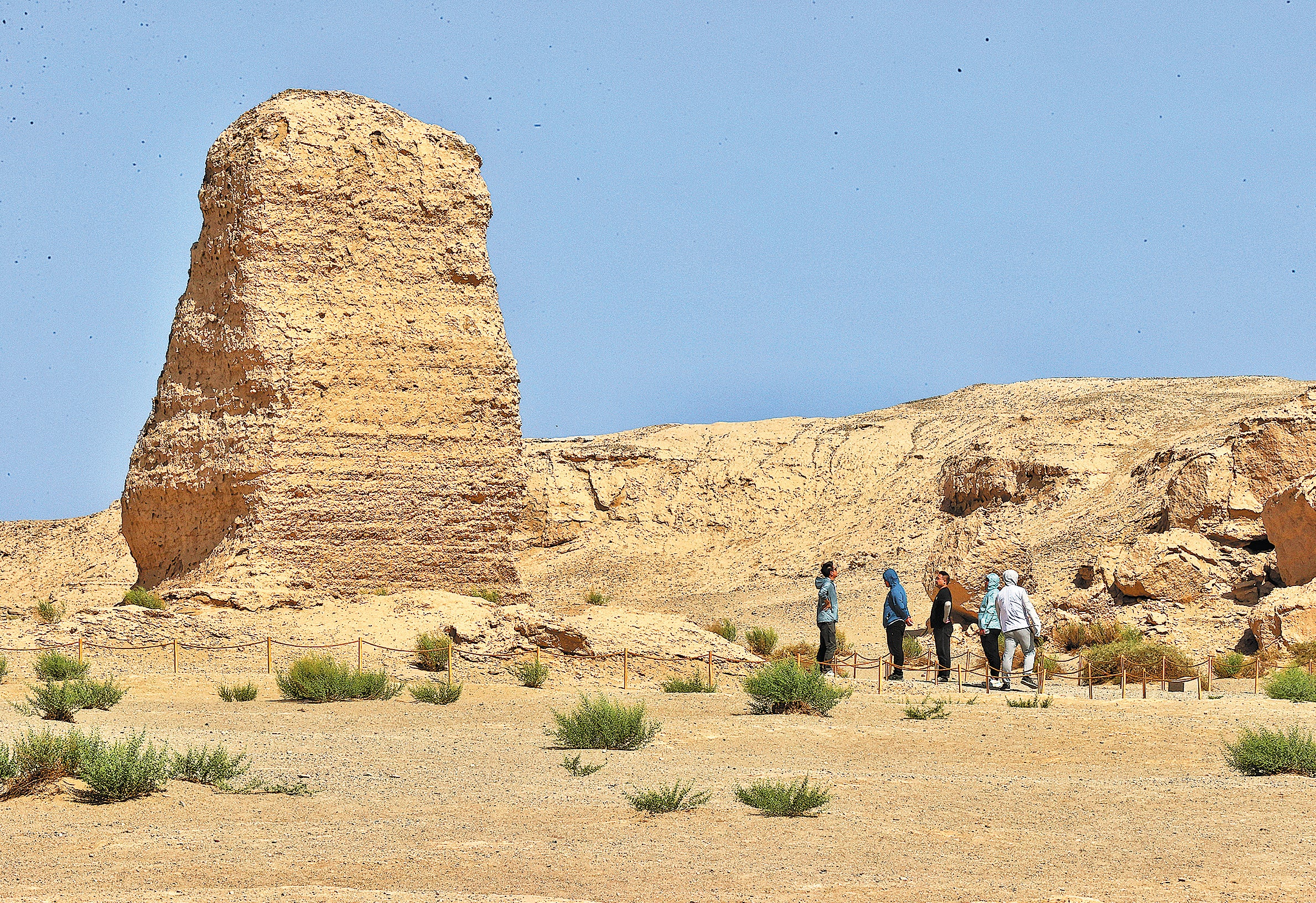Guardians of the Great Wall
THE ARTICLES ON THESE PAGES ARE PRODUCED BY CHINA DAILY, WHICH TAKES SOLE RESPONSIBILITY FOR THE CONTENTS

Deep in the Gobi Desert in Northwest China’s Gansu province, remnants of the Han Dynasty (206 BC-220 AD) Great Wall stand firm. One layer of fine sand, plus a layer of reeds or rose willow, tier upon tier, has made it through two millennia, from a military installation to a representative living heritage.
Two thousand years of sandstorms has not been long enough to weather it down or diminish the evidence of trade and cultural exchanges between the East and the West, nor has the heavy wind howled enough to prevent people from evoking the glory of the ancient Silk Road.
The city of Dunhuang – sitting at the west end of the Hexi Corridor, the main artery of the ancient Silk Road – has a relatively well-preserved section of the Han Dynasty Great Wall.
The Great Wall and the beacon towers in Dunhuang run the length of nearly 124 miles through, mainly, no man’s land northwest of the city, says Zhang Chunsheng, deputy director of the local cultural relics preservation department.
At the Yumen Pass, or Jade Gate Pass, swallows, with their sharp, forked tails, hover above the roofless ruins of a rectangular fortress. Visitors trudge in the wind, curling themselves up in the inadequate shelter of their clothes.
Looking north, fragmentary wetlands are positioned between a vast shrubland. In the distance are ruins of the Han Dynasty Great Wall, running east to west, and the natural barrier of the Shule River and Mazong Mountain.
Such a structure was first built in the reign of Emperor Wudi (156-87 BC) of the Western Han Dynasty (206 BC-AD 24) to resist the threat from the nomadic Xiongnu tribe, later serving as what today would be a customs office.
The Yumen Pass is one of the most important passes established by the Han empire at the west end of the Hexi Corridor. In 2014, the Site of Yumen Pass was included on UNESCO’s World Heritage List, as part of the “Silk Roads: The Routes Network of Chang’an-Tianshan Corridor”, a transnational property of China, Kazakhstan and Kyrgyzstan.
A dozen miles away from the ruins of Yumen Pass, to an area beyond the reach of mobile phone signals, lizards disguise themselves by taking on the colour of the rocks, bodies unmoving, their tape-like tails roll up and unfold nimbly.
Here lie the remains of a military granary Hecang Fortress – which also dates back to the Western Han Dynasty.
Ranger Chen Wanying’s voice breaks through the sound of the visitors’ footsteps. She broadcasts the Notice to Visitors from an obscure bungalow nearby and supervises their behaviour, in case they cross the fence, accidentally tread on some relics or unknowingly cause damage.
Surface temperatures can reach nearly 60C in summer. Chen, 58, and her husband Zhang Jianjun have been living on the sterile land to guard the relics for 11 years. They rely on solar power and a wireless network, and there’s no running water. The alkaline water from the well nearby is tolerable for cooking, but they need to go elsewhere to fetch drinking water.
They inspect the relics regularly – their part of the Great Wall extends around 1.2 miles. If there’s something wrong, they report it to the cultural relics preservation department and let the experts come to inspect and maintain it.
Yet, Zhang Jianjun says, one of the most difficult aspects of their job is to keep wild animals – such as oxen, horses, camels and donkeys – away from the wall in the dead of night. Oxen, particularly, like to use the wall to scratch itches brought by insects or parasites, further endangering its integrity. Therefore, the couple have to drive these animals away, a task that often has to be undertaken several times a night.
As he is turning 60, it’s nearly time for him to retire from a job he’s been passionate about. Zhang Jianjun says that he wants to leave the site to his successors intact and pass on the lessons he has learned – to do the work well, one needs to be patient, resilient, brave and determined.
Subscribe to Independent Premium to bookmark this article
Want to bookmark your favourite articles and stories to read or reference later? Start your Independent Premium subscription today.